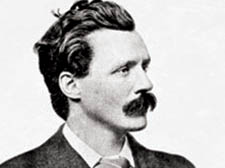|
|
 |
| |

George Gissing |
Vortex of great talent at the core of a chaotic existence
GEORGE GISSING: A LIFE by Paul Delany
Phoenix - £14.99
GEORGE Gissing’s classic New Grub Street (1891), required reading for anyone who has ever thought of writing a novel, is a compelling, witty but bleak account of the hopes, illusions and miseries of authors.
Gissing’s life, which provided much of the material for his novels, was if anything more extraordinary, and tortured, than that of Edwin Reardon, the failed novelist in New Grub Street, even if his own earnings never quite left him starving.
Much of the novel is set in territory familiar to Gissing himself, with its characters moving between Baker Street, Camden Town and Holloway. The caddish journalist Jasper Milvain jilts Marian Yule, whose promised inheritance has disappeared, in Regent’s Park. Marian’s bookish father, Alfred, is told he is going blind near Camden Road Station.
Born in Wakefield in 1857, the son of a chemist, Gissing was a supremely brilliant schoolboy, winning a scholarship to Owens College, Manchester. An academic career was ruled out when he became involved with Nell Harrison, an illiterate prostitute. Stealing to support her, he was caught and sentenced to a month’s hard labour. Following an abortive trip to America, he settled in London and started to write triple-decker novels, also renewing his relationship with Nell. An impossible and quixotic marriage to her was followed by inevitable separation.
After Nell’s death in 1888, in squalid circumstances, Gissing compounded his Pygmalion fixation by a second disastrous marriage to Edith Underwood, the uneducated daughter of a Camden Town stonemason.
Over 25 years, under intense financial pressure and often in miserable domestic surroundings, Gissing poured out a distinguished stream of novels and other stories, adapting to his chosen world by also writing journalism and short stories.
Much of Gissing’s work deals with the dilemmas of class. While in Demos and The Nether World he pioneered working-class fiction, the majority of his novels are about the constraints of lower-middle-class life. His characters live in constant fear of destitution and usually fail to overcome the obstacles put by class between men and women. Gissing himself never resolved these dilemmas, or came to terms with his inner demons.
Paul Delany’s George Gissing, clearly written and well researched, is an excellent account of a man of great talent and essential generosity. It contains, however, little or nothing about the realities of Victorian London, so that it is difficult to judge the accuracy of Gissing’s novels in terms of his observation of contemporary life.
After separation from Edith, who was subsequently committed to a mental asylum, and losing touch with his two sons by her, Gissing moved to Paris in 1899.
He shared the last four years of his life with Gabrielle Fleury, who had translated New Grub Street into French, only to find himself in thrall to her valetudinarian mother. Gabrielle looked after Maman while Gissing himself died slowly from tertiary syphilis, almost certainly caught many years earlier from Nell.
MARTIN SHEPPARD
* |
 |
|
 |
 |
|
 |
|


